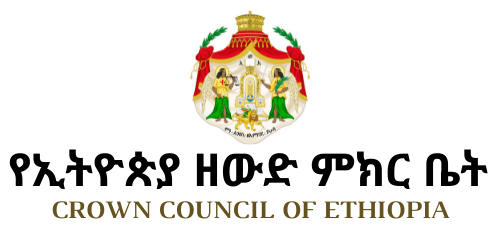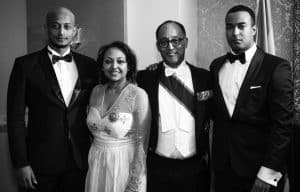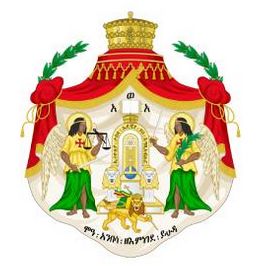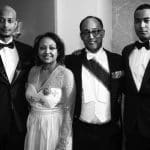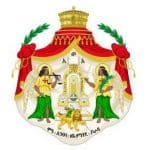The Crown Council of Ethiopia, HIH Prince Ermias Sahle-Selassie, Haile-Selassie, Chairman
Africa in the New Millennium, University of the West Indies Mona, Jamaica
Good evening ladies, gentlemen and distinguished guests. It is both a pleasure and an honor to be with you in beautiful Jamaica, here at the venerable University of the West Indies – where coincidentally, during his legendary initial visit to Jamaica in 1966, your distinguished faculty awarded my grandfather, the Emperor Haile Selassie, an honorary Doctor of Laws degree.
It is clear that Destiny has intimately linked Ethiopia’s Imperial family with the Jamaican people, and We are eternally grateful for the love, enduring friendship and generous hospitality of the Jamaican people.
Looking at the prospect for Africa in the new millennium necessitates first looking back and recognizing those from the past who, through extraordinary effort, skill and personal sacrifice, have made the present what it is – and thus, the future possible. Before embarking on this solemn and joyful journey, I am both cautioned and informed by one of my favourite quotes from My Grandfather:
“The tide that is sweeping Africa cannot be stayed. No force on earth is great enough to halt or reverse the trend. Its march is as relentless and inexorable as the passage of time.”
H.I.M. Emperor Haile Selassie I, April 18, 1960
Being with you here in Jamaica this evening – it would be unthinkable to neglect the charismatic prophet and Jamaican-born black leader Marcus Garvey, who in the 1920s urged all blacks to see themselves in a common struggle, and promoted the concept of one African people. Garvey wanted blacks to view everything through a shared vision and to worship God “through the spectacles of Ethiopia.”
Garvey’s Rastafari beliefs evolved from a particular experience — slavery and its aftermath in Jamaica — and a particular view of how that suffering might be overcome. In this case, worldly hardship was endured through a hope and promise – adapted from the biblical vision of Zion – that someday blacks might return to a land from which they were exiled: Ethiopia.
Also in looking back, we cannot neglect the African Americans, whose heroic struggle for equality essentially reinstated and preserved the human dignity of all people of African heritage. Again, the contributions of Marcus Garvey, Martin Luther King, Rosa Park, and unsung countless members of the Ethiopian and African diasporas – who have made enormous sacrifices of personal time, money and effort – have benefited us all. Indeed, Ethiopia’s own Dr. Melaku Beyan, whose organized resistance to the brutal Italian fascist aggression, received substantial support from countless African Americans and the African Diaspora at large.
Later, what the Emperor’s land grant patronage accomplished for Rastafarians, other extraordinary Jamaicans – Bob Marley most prominently – continued in the arena of international mass media and culture , with their music empowering Rastafari ideas in a global context.
It is important at this point to raise again another of the wonderful and enduring contributions which the Emperor made at around the same time. As a result of the Emperor’s 1966 visit, the Ethiopian Orthodox Church was founded in Jamaica, and thus began the true global journey of our ideals and our particular legacy of Christian ideals, which uniquely reaches back to Biblical times. Jamaica thus became an iconic location for the spread of our ancient faith into the Western Hemisphere.
Finally, and most importantly, the new African Millennium must acknowledge the heroic struggle for independence that was waged and won by gallant African leaders on the African continent. Thus, we salute the memory of Emperor Menelik II, Emperor Haile-Selassie I, Kwame Nkrumah and Jomo Kenyata – as well as the enormous contributions of Julius Neyrere, and Nelson Mandela, whose foresight and immense personal sacrifice enabled all African countries to welcome this new Millennium as free nations.
But now let us turn to the present….and the problems and opportunities facing Africans.
Common sense informs us that it is sheer folly to generalize about Africans and Africa, as the rich regional cultures and diverse historic experiences of the African people defy neat categorization. In what is increasingly being acknowledged as the true cradle of civilization, African cultural diversity flourishes in an exotic profusion of unique and extraordinary beauty, and sometimes-deadly passion. Thus, there is the immediate necessity to develop an encompassing, pan African culture of bridge building promoting understanding and tolerance between people – not by edict and force, but through enlightened agreement and consensus – one-on-one diplomacy.
Enlightenment, of course, derives from education, which requires good health, which requires dependable food supplies, which requires stable economics – and thus the challenge and promise for the African Millennium become clearly framed: Culture, Education, Health, Food and Economics.
ECONOMY
While it is well known that the African continent with its roughly 680MM inhabitants is the only region in the world where the number of extreme poor has actually risen over the past fifteen years, it may be less well known that African countries have experienced major improvements in key development fundamentals. Still, poverty remains at the core of Africa’s problems.
African economies are forecast to grow by an average of 6.2% in 2008 after a strong 2007. The latest edition of the Economic Report on Africa (ERA 2008), the annual joint publication of the UN Economic Commission for Africa (ECA) and the African Union (AU), says that growth on the continent was driven mainly by robust global demand and high commodity prices.
“Other growth factors in Africa include continued consolidation of macroeconomic stability and improving macroeconomic management, greater commitment to economic reforms, increased private capital flows, debt relief and increasing non-fuel exports,” the report says.
It adds that Africa has also witnessed a decline in political conflicts and wars, especially in West and Central Africa, though peace remains fragile in some parts of the continent and growth performance varied sharply across countries and regions
Most of Sub-Saharan Africa is in the World Bank’s lowest income category of less than $765 Gross National Income (GNI) per person per year. Ethiopia and Burundi are the worst off with just $90 GNI per person.
Even middle income countries like Gabon and Botswana have sizeable sections of the population living in poverty.
North Africa generally fares better than Sub-Saharan Africa. Here, the economies are more stable, trade and tourism are relatively high and Aids is less prevalent.
Development campaigners have argued that the rules on debt, aid and trade need reforming to help lift more African nations out of poverty.
HEALTH
Unfortunately, Ethiopia’s health issues are typical of Sub-Sahara Africa. Our population has reached more than 77 millions – populating a landlocked area slightly less than twice the size of Texas. According to the UNFPA’s 2007 report, our population is growing at an average rate of 2.3 percent annually. As in many African nations, HIV/AIDS is an enormous problem, as are many other infectious diseases such as diarrhea, hepatitis A and E, typhoid fever and malaria. First and foremost, we must educate our children, and through them, their parents, to improved hygiene, health care and nutrition.
As We have earlier noted, unless a person is healthy and fed, she has no energy or enthusiasm for anything else.
African affairs activist and performer Bob Geldof recently wrote for Time Magazine, “the current administration in Washington has initiated the President’s Emergency Plan for AIDS Relief (PEPFAR) with cross-party support led by Senators John Kerry and Bill Frist. In 2003, only 50,000 Africans were on HIV antiretroviral drugs — and they were required to pay for their own medicine.” Geldof continues, “ Today, 1.3 million are receiving medicines free of charge. The U.S. also contributes one-third of the money for the Global Fund to Fight AIDS, Tuberculosis and Malaria — which treats another 1.5 million. It contributes 50% of all food aid (though some critics find the mechanism of contribution controversial). On a seven-day trip through Africa, Bush announced a fantastic new $350 million fund for other neglected tropical diseases that can be easily eradicated; a program to distribute 5.2 million mosquito nets to Tanzanian kids; and contracts worth around $1.2 billion in Tanzania and Ghana from the Millennium Challenge Account, another initiative of the Bush Administration.” As unprecedented as it was unexpected, a “point of light” in Washington’s foreign policy has been its generous African largess.
Governments have recently been joined by a long list of private donors and advocates, topped by Bill and Melinda Gates and Warren Buffett, and figures such as Bono, whose contributions to today’s war on disease are truly breathtaking.
Thanks to their efforts, there are now billions of dollars being made available for health spending, with thousands of nongovernmental organizations (NGOs) and humanitarian groups vying to spend it.
But much more than money is required. It takes states, health-care systems, and at least passable local infrastructure to improve public health in the developing world. And because decades of neglect there have rendered local hospitals, clinics, laboratories, medical schools, and health talent dangerously deficient, much of the cash now flooding the field leaks away without substantive result.
Moreover, in all too many cases, aid is tied to short-term numerical targets such as increasing the number of people receiving specific drugs, decreasing the number of pregnant women diagnosed with HIV (the virus that causes AIDS), or increasing the quantity of bed nets handed out to children to block disease-carrying mosquitoes.
Few of today’s donors seem to understand that Africa’s health care problems are a long slog, and that it will take at least a full generation (if not two or three) to substantially improve public health — and that efforts should focus less on particular diseases than on holistic measures that affect populations’ general well-being.
EDUCATION
As I noted earlier, Education, of course, is the single most effective and immediate way to improve the lives of all Africans. For example, about one half our Ethiopian people over the age of 15 can read and write and according to the UNFPA’s 2007 report our population is growing at an average rate of 2.3 percent annually. This means that we will have two million more children each year, with each and every one needing to be fed, schooled, and provided with basic health services and jobs. Our Ethiopian youth, as in any country, represent our nation’s hope for the future. Only by adequately caring for and preparing them is there hope for us to eradicate the social ennui and poverty that plagues our nation.
There is progress. School building has greatly accelerated and enrollment has increased from 39 percent in 1991 to almost 80 percent today, as the government’s budget allocation for education has risen steadily from 14.2 percent in 2001/02 to 19.7 percent in 2004/05. Additionally, a number of higher institutions of learning, both public and private, have opened. Yet the question of the quality of the education as well as the increasing number of dropouts is a continuing concern. Obviously, much remains to be done.
In concert with this educational focus, we must target our training to prepare Ethiopia and Africa’s youth for the most practical and productive jobs of the future, with a strong emphasis on technology.
In this particular regard, help has appeared unexpectedly from the single most revolutionary and empowering instrument for accelerated self-help and social and economic development that the world has ever seen – the Internet.
The Internet’s unique, force-multiplying potential affords all people (under-developed nations in particular) the opportunity (and ability) to literally leapfrog the traditional timetables and infrastructure investments that “More Developed” nations have taken to industrialization and economic development. In this historic and seminal moment, we Africans have realized that literally instantaneous and incredibly inexpensive access to the sum total of all human knowledge (and experience) is now virtually at our fingertips via the Internet. Moreover, inexpensive, direct and virtually instantaneous contact with the Global Community can be established at will.
Through Internet based distributed remote learning, we can now share information and instruction faster, more efficiently and richly than mankind ever dreamed possible and this revolution is just beginning. The implications for learning and bridge-building cultural development are unprecedented, and extend from culture and healthcare to sophisticated telemedicine and beyond.
Power technologies are also evolving and increasingly decentralized – with semi-autonomous power generation in the forms of solar, hydro, wind or geothermal etc. available and becoming cost effective.
This is a time of miracles for humanity and no-one can fully grasp the full spectra of possibility; but I am convinced that the implications are both revolutionary and unprecedented in human experience. This is our moment, the time when underdeveloped nations can catch up, contribute and fairly compete – even with the most advanced societies, and in a profoundly shorter time span than virtually anyone could have imagined only 20 years ago.
Thank you for your kind attention and interest. May God bless Ethiopia, Africa, and Jamaica – and let us all commit ourselves to pray and work for enduring peace and good-will in the world. Let us also pray that during the new African Millennium, we Africans perfect our independence by finding the wisdom to consolidate our victories and forever banish the stigma of underdevelopment, poverty, cultural malaise and disease from our lives.
